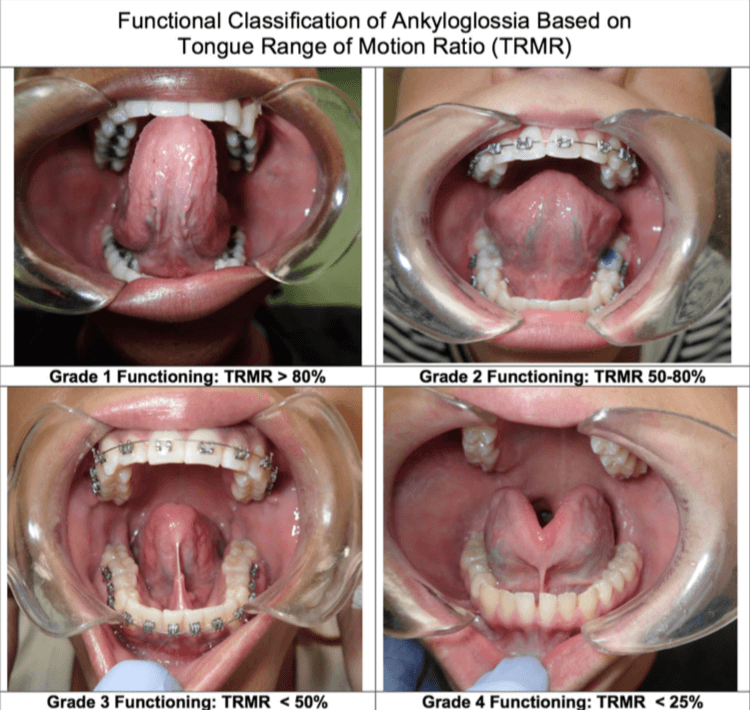WHAT IS TONGUE-TIE?
 The tongue is a muscular organ that is responsible for countless daily functions, such as speech, taste, digestion, expressing affection, breathing, drinking, and even cleaning. However, some people may complete these actions with difficulty or impairment. One condition that can lead to reduced movement in the tongue is ankyloglossia or tongue-tie. Having suffered from this himself, osteopathic physician Dr. Matthew Barker has carefully studied the effects of tongue-tie in children, teens, and adults alike. At Integrative Pain and Wellness Center, Dr. Barker and Dr. Gray are proud to help prepare patients for a tongue-tie release to free the tongue, improve oral movement, and enhance your overall quality of life. If you think you may have tongue-tie or tethered labial frenulums (lip tie), contact our office in Southlake, TX and the surrounding areas of Midland and Odessa, TX and schedule your private appointment with a member of our team.
The tongue is a muscular organ that is responsible for countless daily functions, such as speech, taste, digestion, expressing affection, breathing, drinking, and even cleaning. However, some people may complete these actions with difficulty or impairment. One condition that can lead to reduced movement in the tongue is ankyloglossia or tongue-tie. Having suffered from this himself, osteopathic physician Dr. Matthew Barker has carefully studied the effects of tongue-tie in children, teens, and adults alike. At Integrative Pain and Wellness Center, Dr. Barker and Dr. Gray are proud to help prepare patients for a tongue-tie release to free the tongue, improve oral movement, and enhance your overall quality of life. If you think you may have tongue-tie or tethered labial frenulums (lip tie), contact our office in Southlake, TX and the surrounding areas of Midland and Odessa, TX and schedule your private appointment with a member of our team.
Reviews
What Are the Benefits of Tounge-Tie Treatment?
Tongue-tie treatment has a wide range of benefits. Some of the common benefits include:
- Easier for children and adults to eat and babies to bottle or breastfeed
- Improved speaking abilities
- Reduces risk of oral issues, such as tooth decay or gum disease
- Eliminates gaps in the teeth for improved facial appearance
- Reduces pain or discomfort caused by the tongue-tie
SIGNS AND SYMPTOMS
Tongue-tie and lip tie are congenital conditions that occur in roughly 5% of the population, making them more common than most people believe. These conditions affect a larger percentage of men than women. Some issues that you may experience if you have ankyloglossia or tethered labial frenulums include:
- Feeding difficulties in newborns

- Muscle tightness
- Speech issues or swallowing problems
- Obstructive sleep apnea (OSA)
- Teeth crowding
- Nasal congestion
- Poor posture
- Neck pain
- Headaches
- TMD (temporomandibular joint disorder)
- A dental cross-bite
- Teeth grinding (bruxism) or jaw clenching
- Disproportionate growth of the mandible and maxilla
HOW IS TONGUE-TIE TREATED?
To treat tongue-tie in kids, teens, and adults, our team at Integrative Pain and Wellness Center will perform Osteopathic Manipulative Treatment to help prepare you for a tongue-tie release, which can be done using laser technology or medical instruments. To start off, Dr. Barker or Dr. Gray will first hold a consultation with you to determine if you have ankyloglossia or lip tie. Once this has been identified, we will craft your personalized treatment plan that will consist of the removal of the tissue connecting your tongue or lip to your mouth, pre- and post-operative exercises to reintroduce proper tongue and lip movement, and pre- or post-operative osteopathic manipulative treatment (OMT).
Who Is a Candidate for Tongue-Tie Treatment?
Tongue-tie treatment is useful for infants and young children who have a tongue tie that causes issues with swallowing, speaking, or feeding. If a child does not have these problems, they may not need this procedure. However, for children who do experience these types of issues, tongue-tie treatment can alleviate them by severing the lingual frenulum, freeing up their tongue.
Tongue-Tie Treatment FAQ
What causes tongue-tie?
Tongue-tie happens when a band of tissue known as the lingual frenulum does not separate from the bottom of the tongue and instead remains attached. The exact causes of tongue-tie are unknown, but it is generally believed that genetics plays a major role.
Does a tongue-tie treatment hurt?
No, because the tissue targeted in a tongue-tie treatment has few nerve endings, most patients won't find the procedure painful. Depending on the treatment selected for you or your child, the procedure may be performed under general anesthesia (patient is asleep) or with local anesthesia to numb the treatment area. After the procedure is completed, there may be some mild soreness or discomfort during recovery, but this is typically minor and easily controlled with OTC pain relievers (always consult your physician before taking any medications).
Can adults have tongue-tie treatment?
Yes, they can. At Integrative Pain and Wellness Center, we treat everyone from children to teens and adults for tongue-tie.
How long is recovery after a tongue-tie treatment?
The mouth heals very quickly, so most patients will recover fully within about two weeks after their procedure.
How is tongue-tie diagnosed?
Diagnosis is typically done through a physical examination by a member of our team at Integrative Pain and Wellness Center. The severity of the condition and its impact on function will be assessed.
When is the best time to treat tongue-tie?
For infants with breastfeeding issues, treatment may be done soon after birth. In older children and adults, treatment can be performed when the symptoms or functional limitations become apparent.
FREE MOVEMENT AND PAIN RELIEF
At Integrative Pain and Wellness Center, our team works hard to ensure your daily comfort and relief from pain. There are many factors that can lead to discomfort that you may not even know about, such as tongue-tie and lip tie, conditions that cause the tongue or lip to be too closely tethered to the lower portion of the mouth. Our Southlake, TX office works at every angle to determine the cause of your pain and eliminate it at its root. Contact our facility to schedule your one-on-one with Dr. Barker or Dr. Gray and find out what living a life of comfort truly means.








